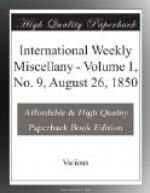Upon a mind so constituted, with its psychological peculiarities so cherished and confirmed, the fortunes and fates of others, and the stirring events of his time, made vivid but very transient impressions. The conversation and writing of contemporaries trained among books, and with the faculty of speech more fully developed than that of thought, seemed colorless and empty to one with—whom natural objects and grandeurs were always present in such overpowering force. Excluded by his social position from taking an active part in the public events of the day, and repelled by the emptiness of the then fashionable literature, he turned to private and humble life as possessing at least a reality. But he thus withheld himself from the contemplation of those great mental excitements which only great public struggles can awaken. He contracted a habit of exaggerating the importance of every-day incidents and emotions. He accustomed himself to see in men and in social relations only what he was predetermined to see there, and to impute to them a value and importance derived mainly from his own self-will. Even his natural good taste contributed to confirm him in his error. The two prevailing schools of literature in England, at that time, were the trashy and mouthing writers who adopted the sounding language of Johnson and Darwin, unenlivened by the vigorous thought of either; and the “dead-sea apes” of that inflated, sentimental, revolutionary style which Diderot had unconsciously originated, and Kotzebue carried beyond the verge of caricature. The right feeling and manly thought of Wordsworth were disgusted by these shallow word-mongers, and he flew to the other extreme. Under the influences—repulsive and attractive—we have thus attempted to indicate, he adopted the theory that as much of grandeur and profound emotion was to be found in mere domestic incidents and feelings, as on the more conspicuous stage of public life; and that a bald and naked simplicity of language was the perfection of style. Singularly enough, he was confirmed in these notions by the very writer of the day whose own natural genius, more than any of his contemporaries, impelled him to revel in great, wild, supernatural conceptions; and to give utterance to them in gorgeous language. Coleridge was perhaps the only contemporary from whom Wordsworth ever took an opinion; and that he did so from him, is mainly attributable to the fact that Coleridge did little more than reproduce to him his own notions, sometimes rectified by a subtler logic, but always rendered more attractive by new and dazzling illustrations.




